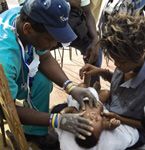Tales from the front
Doctors are usually among the first to offer aid.
Doctors are usually among the first to offer aid. And thanks to the ease of international travel and communication, and the wealth of information available on the World Wide Web, it's easier than ever for doctors to translate that desire to help into action.

PERSONAL CONNECTION LEADS TO VOLUNTEERING
"We had to go out to where the patients were, to their homes, to neighborhood centers, to shelters. It was pretty much just providing first aid, people who had infections from the water, or who had lost access to their medication," he said. The neighborhood outreach continued over a period of several weeks.
Tragedy called him again in January 2010, in the form of the earthquake that leveled much of Port-au-Prince. "When that happened, I felt obligated to get there as soon as I could," he said. "Having experienced disasters before, I knew how critically important it was right at the outset to make as many resources as possible available to the people there."
With Ochsner's support, Laborde established the Ochsner Haitian Relief Fund. Because Haiti was not yet accessible by air, he flew to the neighboring Dominican Republic and drove to Haiti, arriving with food and medical supplies 5 days after the quake.
"The destruction I saw was almost apocalyptic," he said. Laborde spent a total of nearly 8 weeks in the country during 3 visits, treating the injured and dispensing medications, food, and water.
Laborde credits his colleagues and Ochsner's support with enabling him to volunteer in Haiti. "There is a lot of support for volunteerism, because we kind of consider that as part of our mission. Many of the physicians in leadership positions realize the volunteer work I do is what they would do if they had the capacity. So they kind of channel that through me."
A COMMUNITY RESOURCE
When Robyn Chatman, MD, FAAFP, a family practitioner in Cincinnati, saw TV reports of the destruction Katrina had wreaked on her hometown of Gulfport, Mississippi, she knew what she had to do. She and her husband loaded their SUV with medical supplies and set off.
Once there, Chatman set up shop in the driveway of her parents' home. "The first day it was mostly neighbors," she recalls. "I handed out lots of samples of diuretics and thyroid medicine and treated cuts and bruises." She returned a week later with specific medications people had requested, such as eye drops and tamsulosin.
Chatman made 6 trips to Gulfport between August and the end of the year, spending about a month there. Over that time, the nature of her work changed, from treating minor injuries to treating patients with ongoing needs such as diabetes.
As a result of her experience, Chatman joined a federal disaster medical assistance team (DMAT), part of the US Department of Health and Human Services' National Disaster Medical System. There, she has received training in responding to a variety of disasters.
A DOUBLE BLESSING
Medical volunteering needn't always involve traveling long distances to a disaster site. Sometimes the disaster comes to you. That was the situation Jordan Asher, MD, encountered after Katrina when patients from New Orleans were evacuated to Saint Thomas Hospital, where Asher practiced internal medicine. He was part of a group of doctors who worked around the clock triaging arriving patients.
Five years later, when floods struck Nashville, Asher was working almost entirely in an administrative position for the hospital's parent organization, Saint Thomas Health Services. Nevertheless, he joined a team of Saint Thomas providers traveling around the city and surrounding areas, delivering tetanus and hepatitis shots. "The biggest thing about the shots is, often people didn't even know they needed them," he said. "That made it a double blessing."
At first, Asher and his team advertised their services by posting signs in devastated areas or operated next to food distribution centers. "Pretty soon we started getting calls from the health department telling us where they needed help, because they had run out of vaccine." The team administered about 600 shots over 3 days.
He says that the volunteer work has been very rewarding. "I feel I've been given sort of a God-given gift, and that's what the gift is there for."